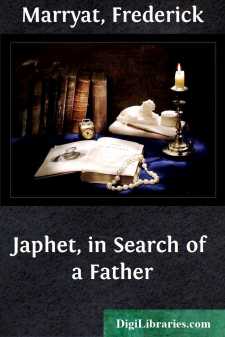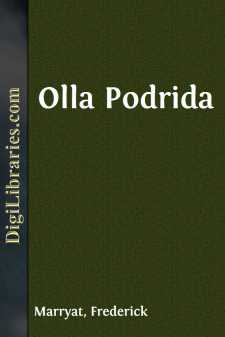Categories
- Antiques & Collectibles 13
- Architecture 36
- Art 48
- Bibles 22
- Biography & Autobiography 813
- Body, Mind & Spirit 142
- Business & Economics 28
- Children's Books 17
- Children's Fiction 14
- Computers 4
- Cooking 94
- Crafts & Hobbies 4
- Drama 346
- Education 46
- Family & Relationships 57
- Fiction 11829
- Games 19
- Gardening 17
- Health & Fitness 34
- History 1377
- House & Home 1
- Humor 147
- Juvenile Fiction 1873
- Juvenile Nonfiction 202
- Language Arts & Disciplines 88
- Law 16
- Literary Collections 686
- Literary Criticism 179
- Mathematics 13
- Medical 41
- Music 40
- Nature 179
- Non-Classifiable 1768
- Performing Arts 7
- Periodicals 1453
- Philosophy 64
- Photography 2
- Poetry 896
- Political Science 203
- Psychology 42
- Reference 154
- Religion 513
- Science 126
- Self-Help 84
- Social Science 81
- Sports & Recreation 34
- Study Aids 3
- Technology & Engineering 59
- Transportation 23
- Travel 463
- True Crime 29
Frederick Marryat
Frederick Marryat (1792-1848) was a British Royal Navy officer and novelist, best known for his sea adventure novels. He is considered a pioneer of nautical fiction, influencing later authors like Joseph Conrad and Herman Melville. His notable works include "Mr Midshipman Easy" and "The Children of the New Forest," which vividly depict naval life and adventures during the Napoleonic Wars.
Author's Books:
Sort by:
Introduction. After many years of travel, during which I had seen men under almost every variety of government, religion, and climate, I looked round to discover if there were not still new combinations under which human nature was to be investigated. I had traversed the old country until satisfied, if not satiated; and I had sailed many a weary thousand miles from west to east, and from north to...
more...
Chapter I These are the errors, and these are the fruits of misspending our prime youth at the schools and universities, as we do, either in learning mere words, or such things chiefly as were better unlearned.—MILTON. My father was a gentleman, and a man of considerable property. In my infancy and childhood I was weak and sickly, but the favourite of my parents beyond all my brothers and sisters,...
more...
My Birth, Parentage, and Family Pretensions—Unfortunately I prove to be a Detrimental or Younger Son, which is remedied by a trifling accident—I hardly receive the first elements of science from my Father, when the elements conspire against me, and I am left an Orphan. Gentle reader, I was born upon the water—not upon the salt and angry ocean, but upon the fresh and rapid-flowing river. It was in...
more...
Part 1—Chapter I. Like most other Children, who should be my Godfather is decided by Mammon—So precocious as to make some Noise in the World, and be hung a few days after I was born—Cut down in Time, and produce a Scene of Bloodshed—My early Propensities fully developed by the Choice of my Profession. Those who may be pleased to honour these pages with a perusal, will not be detained with a...
more...
Chapter I Like most other children, who should be my godfather is decided by Mammon—So precocious as to make some noise in the world and be hung a few days after I was born—Cut down in time and produce a scene of bloodshed—My early propensities fully developed by the choice of my profession Those who may be pleased to honour these pages with a perusal, will not be detained with a long...
more...
Chapter One. It was in the month of October, 18—, that the Pacific, a large ship, was running before a heavy gale of wind in the middle of the vast Atlantic Ocean. She had but little sail, for the wind was so strong, that the canvas would have been split into pieces by the furious blasts before which she was driven through the waves, which were very high, and following her almost as fast as she...
more...
Chapter XXVI The next day, when Mr. Seagrave, William, Juno, and Ready were all at work at their allotted tasks, Mrs. Seagrave was sitting down at the front of the tent, the little baby, Albert, crawling close to her, Caroline trying to work with her needle, and Tommy was making holes in the ground, and putting a small stone into each hole. "What are you doing, Tommy?" said Mrs. Seagrave....
more...
CHAPTER I Which the reader will find very easy to read. Mr Nicodemus Easy was a gentleman who lived down in Hampshire; he was a married man, and in very easy circumstances. Most couples find it very easy to have a family, but not always quite so easy to maintain them. Mr Easy was not at all uneasy on the latter score, as he had no children; but he was anxious to have them, as most people covet what...
more...
Volume One--Chapter One. And what is this new book the whole world makes such a rout about?—Oh! ’tis out of all plumb, my lord,—quite an irregular thing; not one of the angles at the four corners was a right angle. I had my rule and compasses, my lord, in my pocket.—Excellent critic! Grant me patience, just Heaven! Of all the cants which are canted in this canting world—though the cant of...
more...
Chapter One. April 3, 1835. Reader, did you ever feel in that peculiarly distressing state of mind in which one oppressing idea displaces or colours every other, absorbing, intermingling with, empoisoning, and, like the filth of the harpy, turning every thing into disgust—when a certain incubus rides upon the brain, as the Old Man of the Mountain did upon the shoulders of Sinbad, burdening,...
more...











